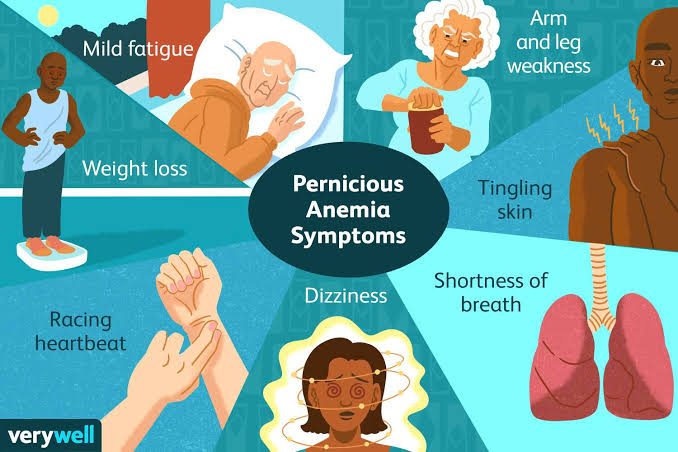
Pernicious anemia
Pernicious anemia is a type of anemia that is classified as megaloblastic anemia and results in a deficiency in vitamin B12.
Mechanism of disease
Vitamin B12 cannot be synthesized within the body, and the only source of this vitamin is animal products such as meat and dairy (external source). This vitamin is naturally absorbed in the ileum (the last part of the small intestine). After eating food and obtaining vitamin B12, it binds to a protein called R -binder The compound is R-B12. It is worth noting that the R protein is secreted in saliva. In the duodenum, under the influence of pancreatic juice, the compound R-B12 is released and at this stage it binds with intrinsic factor, which is secreted by the cells of the stomach wall. This connection continues until the intrinsic factor-B12 complex reaches the ileum, and here the intrinsic factor binds to its receptors, leading to the absorption of vitamin B12. In the case of pernicious anemia, there is atrophy of the cells of the stomach wall that secrete intrinsic factor, which leads to a reduction in secretion or its complete cessation, causing a defect. In the absorption of vitamin B12.
Causes of injury
In most pathological cases, the cause of pernicious anemia is an autoimmune disease in which autoantibodies are secreted against the cells of the stomach wall, leading to their atrophy, as well as the secretion of antibodies to intrinsic factor. Anemia may occur in conjunction with other autoimmune diseases such as Addison’s disease (adrenal gland disorder), type 1 diabetes, and Hashimoto’s thyroiditis. Or partial or complete cutting of the stomach, or the presence of antibodies in the patient’s serum against the internal factor that helps absorb Vit B12, or genetic reasons.
Symptoms
General weakness + symptoms of anemia.
Pain in the tongue.
Loss of appetite + alternating diarrhea and constipation.
Numbness in the extremities.
Mild enlargement of the liver and spleen.
Accelerated heartbeat + low blood pressure.
treatment
This is done by giving doses of vitamin B12, whether in the form of pills, which are larger than normal, to overcome the absorption problem, or by using injections. However, this disease is often chronic and the treatment is lifelong.






